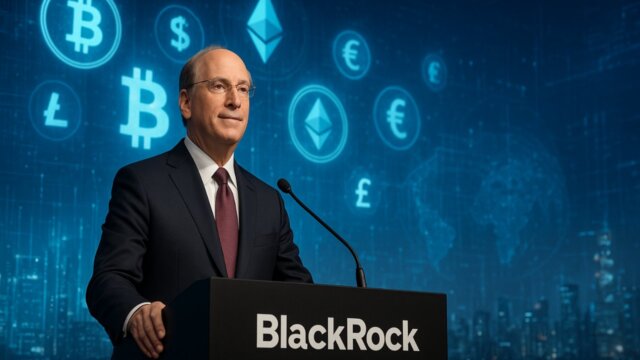- Larry Fink, CEO of BlackRock, highlights the influence of global money policies on the future of cryptocurrencies.
- He warns that if governments continue to depreciate their currencies, people may increasingly turn to crypto assets.
- He indicates that Bitcoin and other digital currencies are considered backup options for investors losing trust in traditional banks and the financial system.
In a striking turn of events, Larry Fink, the Chief Executive Officer of the world’s largest asset-manager, BlackRock, has publicly articulated a vision in which cryptocurrencies may emerge as viable global choices when traditional currencies falter. What once seemed speculative or fringe is now being elevated to mainstream strategic conversation.
From Skepticism to Support
For much of his career, Fink expressed caution – even skepticism – about cryptocurrencies. That stance has shifted dramatically. In a recent panel at the Future Investment Initiative in Riyadh, he declared: “If you believe that countries are going to continue to debase their currency, owning crypto assets or gold are assets of fear… You own these assets because you’re frightened of the debasement of your assets.” These words reflect a marked departure from his earlier commentary, when he referred to cryptocurrencies as used by “money launderers and thieves.”
What’s Driving the Shift?
The backdrop to Fink’s remarks is clear: mounting global debt, rising inflation, and currency debasement concerns. He pointed out that investors are increasingly turning away from traditional currencies and government debt, instead gravitating toward gold and crypto as alternative stores of value. In his view, this isn’t just about speculation — it’s about preserving value and trust in a financial system under strain.
Why the Timing Matters
Several key factors make Fink’s commentary especially noteworthy right now:
- Institutional endorsement: BlackRock, which manages trillions in assets, has launched or backed crypto-related investment products, bringing legitimacy to the space.
- Macro instability: With governments printing more money, and inflation biting, the trust in fiat currencies and banking systems appears more fragile.
- Tokenization trends: Fink also highlighted that regulators and central banks are paying attention to tokenization of assets — a sign digital finance is becoming more entrenched.
Crypto as a “Hedge” — But with Cautions
Fink’s message can be distilled into a few core ideas:
- Crypto (and gold) as hedges: He described holdings in digital assets or precious metals as “assets of fear”, meaning that they serve as insurance when confidence in conventional assets wanes.
- Shift in institutional mindset: The fact that BlackRock is openly embracing crypto signals a broader institutional shift — not just retail hype anymore.
- Systemic risk acknowledgement: By pointing to currency debasement and excessive debt, Fink acknowledges that the traditional financial system may face structural pressures.
At the same time, it’s not a blanket endorsement. Fink underscores that these are alternative assets, not replacements for fiat currencies or traditional financial instruments — at least not yet.
The Institutional Entry: BlackRock’s Role
Under Fink’s leadership, BlackRock has made significant moves:
- Launching spot-Bitcoin ETFs and other crypto investment vehicles, making it easier for institutional investors to access the space.
- Signalling confidence to other large investors that digital assets can play a legitimate role in diversified portfolios.
- Acting as a bell-wether: If the largest asset manager in the world gives crypto a seat at the table, others may follow.
These actions feed into Fink’s message that crypto is no longer just a fringe alternative, but one increasingly considered in mainstream asset allocation discussions.
Global Implications: Beyond the U.S.
While much of the conversation takes place within the U.S. asset-management sphere, the implications are global:
- Countries with weakening currencies, or those facing inflation and currency issuance risks, may see crypto adoption accelerate.
- Institutional interest coming from multiple jurisdictions could raise the profile of digital assets as international reserve or hedge tools.
- Regulatory and structural shifts — such as tokenization of real-world assets — suggest that the concept of digital finance is being taken seriously at a systemic level.
Final Thoughts
In sum, Larry Fink’s recent remarks represent more than just another bullish comment on crypto. They reflect a shift in perspective at one of the world’s most influential asset-management firms: that cryptocurrencies may not only be a speculative asset class but also a strategic hedge in a world worried about currency value and financial system trust. While challenges remain — regulatory, structural, and volatility-based — the narrative is changing. For investors, asset managers, and policymakers alike, the message is clear: digital assets are moving into the mainstream discussion of value preservation and portfolio strategy. Whether crypto ultimately becomes a global reserve instrument—alongside gold, fiat, and government bonds—remains to be seen. But the fact that BlackRock and Larry Fink are placing it on that very table is significant.
Disclaimer: CryptopianNews shares this for learning and info only. It’s not meant to be financial or investment advice. Crypto markets change a lot and move quickly. Investing in them can be risky. You should always look into things yourself. Talk to a trained financial advisor before making any choices about investing.
- Fed Balance Sheet Reduction Shakes Global Markets - January 30, 2026
- Inside the White House Crypto Meeting on Digital Assets - January 28, 2026
- Wall Street Warns: US Crypto Policy Clouds the Market - January 26, 2026

